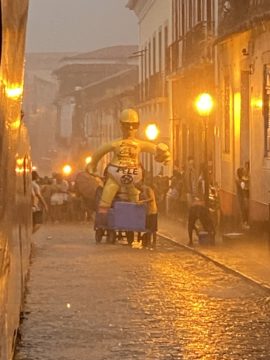by David Winner

São Luís: Far Northeast of Brazil
People crowd around a samba band playing on a crumbling colonial staircase. A man in his early twenties lightly touches my shoulder as I climb upwards, whispering something in Portuguese that I don’t understand. I don’t think he’s trying to sell me anything. I stick out, a white American in a black and brown part of Brazil, but no one has been approaching me.
Smiling vaguely at him, I keep going, sipping vacantly from the huge caipirinha that I’d purchased from a street vender earlier in the evening.
Once I reach the top of the stairs, free from the crush of the crowd, I stand listening to the music, inelegantly bumping my hips in some approximation of dancing.
Ten years ago on another riotous Saturday night, I’d visited São Luís before. And found its denizens drinking, dancing, singing all over the Centro Histórico like in some MGM musical. But a fundamental change has occurred. Before, everyone had been evidently heterosexual, no one announcing their queerness in a way that a bystander could detect. But now, below the staircase and the sambistas, throughout the streets, are women coupled with women, men coupled with men, trans men, trans women, and drag queens like I’d landed in a pride parade, a queer explosion only months past Lula’s victory over the virulently homophobic Bolsonaro.
 The man who’d spoken to me before appears at my side and whispers into my ears again.
The man who’d spoken to me before appears at my side and whispers into my ears again.
I smile, perhaps I say, “sim,” the universal yes of miscomprehension.
But then he speaks to me in a language that I’ve barely heard in São Luís, English.
In recent years, I’ve taken to wearing odd polo shirts that I’ve purchased on my travels, and the young man is sweetly informing me that the one I have on now is “inside out,” that very particular idiom streaming seamlessly from his mouth.
It is warm. Some men are shirtless. But I don’t feel comfortable exposing my middle-aged chest to take off my shirt and put it back again properly.
We start to chat as the rain, on and off all evening, begins to pick up.
He is lanky, handsome, slightly gap-toothed with curly, kinky hair. In the United States, he would be black or biracial, but here he is simply Brazilian. His name is Ian. He speaks English so well because he had been close friends with another Ian, an Australian, who had been living in São Luís. But the Australian Ian, the Brazilian one tells me, sighing wistfully, had returned home.
He asks me what I do in the United States.
Teach, I tell him. Writing, I go on, when he asks for specifics. It’s a rote conversation, but Ian seems interested.
But when I ask what he does, he looks away.
“Scrape by,” another perfect idiom. Nothing interesting, worth relating, at least not to me.
I have another question perhaps an easier one. I’ve faced a challenge since arriving in Brazil. The thought of any interaction with supporters of Bolsonaro appalls me. But with poor language skills and an ignorance of social cues, I can’t possibly identify them. Trump ones are easier. We come from the same culture however separate we may feel.
I don’t get into all of that. How can I identify a Bolsonaro supporter is all I ask.
“You really can’t,” he tells me. But “nobody,” he goes on to assure me, gesturing around him at the staircase, the samba band, the sounds of revelry, “nobody here supports Bolsonaro.”
I’m bleary, the sort of hangover you get later in the evening after drinking earlier, my stomach hurts, I’m wet, and cold. I’m pushing sixty, older than anyone surrounding me. The rain is soaking now, on the edge of pouring. We are near the Amazon, after all, a rain forest. Turning to Ian, I begin my abrupt and awkward goodbyes. I need to get out of the rain, I tell him, and back to my room.
Our interaction has been short. He is so much younger than I am, and I appear to have upset him, hurt him even. He may have had many disappointments, and here is another tiny one.
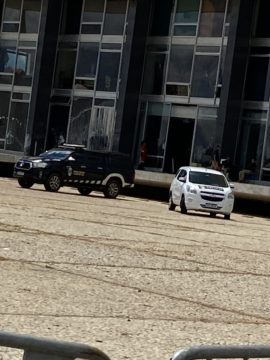
Since my father’s death the year before, I’ve traveled quite a bit, mostly alone. I’d already booked flights to São Luís through Brasilia before the uprising on January 18, but when I’d visited the damaged buildings during my two days there, I’d felt like an interloper, a political paparazzo.
In Brasilia and in São Luís, I’ve wandered from street to restaurant to hotel room, only vaguely interacting with others, content with the sharp limitations of my Portuguese. And the Brazilians I’ve run into, despite the country’s well-earned reputation for conviviality, have not particularly concerned themselves with the presence of this stray American.
But Ian has. Tender Ian. Lovely Ian.
Ian smiles meekly, flirtatiously it seems, and offers to come back with me to my hotel room.
I’m married to a woman. Faithful, too. No one has been inviting themselves back to my room.
Boys
When I was about seventeen, a bit younger than Ian, a certain feeling slipped away from me, a desire for boys.
Probably something to do with societal pressure though my parents’ gay friends seemed reasonably content. Being gay would be challenging, I’d worked out for myself, but not unlivable. Despite the stark absence of fundamentalist Christian reeducation or even particular inner struggle, those feelings quite quickly waned. Obviously, I’ve pondered this and don’t want it to take over the story. Like everyone, I have my own peculiar sexuality. There are many aspects of myself which I’ll never stop struggling to figure out. But which gender I identified as and which gender I felt attracted to came clear to me, like it does to many kids, including trans ones, pretty early on. My brain kept growing, I assume, but that didn’t change.
Which leaves the question many years later. How queer am I? Queer adjacent or queerish the way George Santos is Jewish. I most certainly fit the older definition of the term, in any case, an oddball to say the least.
When I was younger out of some perceived simpatico with those that my Italian father-in-law called “the gay,” I didn’t always claim a straight identity and was often read as queer.
In the early nineties, I taught in a vitriolically homophobic environment, a community college in Jersey City only about twenty minutes by train and foot from the Stonewall Inn. One young male student, recently released from Rikers Island, made a public spectacle of only ever facing me front forwards, depriving me of the opportunity to gaze upon his ass.
Back in Brooklyn, I inhabited a queer-adjacent world. But as the years went by, my circle of friends began to break down into straight couples like my wife, Angela, and myself. There were gay people in our world, and homophobia was reliably scorned. Which seemed to reflect the zeitgeist as marriage equality became the norm, and barriers against queerness appeared to break down.
Even Donald Trump, upon winning the presidency, indicated that same-sex marriage along with weed legalization were progressive causes that he would not obstruct. Maybe there were too many weed smoking Republican queers for him to object.
The Swamp Creature
I’m sorry, I tell Ian. And shaking my head apologetically, I take off into the night.
As I climb up towards the street on which I imagine my hotel is located, I question the assumption that I had just made, that his had been a romantic proposition. Decades before, I’d had a friend named Bill who erroneously believed that every woman and almost every man wanted to sleep with him, a condition which I had dubbed Billitis. Maybe I’d just developed Daviditis. Ian could well have wanted companionship, a chance to speak English, money. Even if he had been willing to sleep with me, “willing” would have been the operative term. I couldn’t suddenly be some magnet for young men. In any case, I had abruptly and senselessly abandoned him.
Absolutely pouring now, I duck into a doorway for protection. A man walks by with a huge umbrella, offering me dry passage to wherever I’m going, but interpreting his gesture as somehow transactional, I refuse. And thus enter a disturbing, disorienting serious of moments. Earthquakes, floods, climate change all around, but I’ve felt quite safe in Brooklyn except my luck seemed to be running out, the chickens having come home to roost.
Drunk, disoriented, upset with myself, I wander randomly back and forth the surrounding streets in search of my hotel, occasionally stopping under stoops to put on my reading glasses and try to access Google Maps on my dying phone. Completely waterlogged, it’s like I’ve jumped into the ocean with my clothes. What would be the consequences, I wondered, of not finding my way that night. Could I actually drown?
Finally, after what may have only been minutes but felt like hours, I reach what I believe to be the right street, but the small colonial building that houses my hotel keeps hiding from me.
I power down my phone, hoping to save it from the elements.
Across the street, there is a bar. I can see a few people inside through its windows. I can order another drink, take a breath, wait for my phone to come to its senses and plot my course from there.
But a woman about my age, the proprietress, rushes to the door as I attempt to penetrate her establishment and signals with her hands that I cannot come in. It is not that I am white, that I am foreign, that I am drunk, that my polo shirt is inside out. It is that am already, just at the threshold, leaking water all over her floor. I hesitate for a moment as if I had the means to compel her to let me stay, but, of course, I do not.
Outside the bar, my bladder starts to pulse. I don’t tend to piss myself, but the rain, the general disorientation, makes it seem imminent.
Peering through the waves of water, I see a patch of greenery. I struggle towards it, make sure no one is around me and let myself pee, watching the smaller stream swept away by the greater one coming from above. Once I’m done, I walk back towards the street, but suddenly I feel jolted. The sky is no longer on top of me, and the ground is no longer below as I’ve tripped in the mud. Scrambling to my feet just lands me back on the ground, and it takes a slow concerted effort to get vertical again.
And when I’m back on the street, dashing from doorway to doorway, I think of Ian who, if he had somehow wanted me before could hardly be interested in the swamp creature that I have become.
When I finally find the right door, I can’t get the European key to fit in the lock and bang against it in frustration. And a staff member, a young woman as dry as I am wet, opens it only to be confronted by a considerably disintegrated version of the American guest she’d seen earlier in the day. Nevertheless, she steps aside and lets me in.
Stripping myself of my clothes, I stand under the shower until warm then hot water washes over me. Mud collects in the drain, and somewhere out there is Ian, probably on his way to whichever suburb of São Luís or neighboring village in which he lives. He is wet too, possibly cold, but may not have the luxury of hot water at all hours of the night.
Once I’m clean and dry, I climb into the large bed and stare soberly at the ceiling, the rain having washed away the drink.
Queer
As I wait for sleep to wrap its hands around me, I remember the scene in front of a bar called Queer that I’d chanced across before seeing the samba band on the stairs. Packed both inside and out with gay couples, men and women in drag, people with gender identities that, as a straight person and a foreigner, I could not fully assimilate. All in a Christian Catholic Brazil until recently run by a self-declared “proud homophobe.”
A queer wave may be sweeping across the Americas. I don’t have children of my own, but so many of the children of my peers identify in some way as queer.
And some people are skeptical. I’ve often heard it claimed in the United States that queer is somehow “cool,” that people claim it just to fit in. But I think that that assertion “lacks evidence,” to use that post-Trump term. Being queer takes bravery.
In fact, a police car had stopped in front of the bar called Queer as I was passing by. While the officers stayed only briefly and never strayed far from their vehicles, there was a palpable tension, silence, fear on the street.
And I can imagine worse in the United States. With the attacks on LGBTQ rights in red states and the Supreme Court’s recent positions, queer rights, particularly trans rights, are more and more threatened. I think of the skeptical looks on the faces of reasonably progressive people when the topic of transgender comes up, awkward like all discussions of other with no other present to represent like white people pontificating about race.
Maybe some do declare themselves queer to fit in. Maybe those with not-fully-formed adolescent brains should not seek gender-affirming surgery. Trans women may not have experienced the lifetimes of sexism that cis women have. As a straight cis man, I can hardly say. There may be truth in these contentions, but I don’t think it is for those of us who are not exactly queer or not queer at all to say. My experiences in São Luís, my interaction with Ian, who may not have been queer at all, suggest a grand old slogan,
We’re here. We’re queer. Get used to it.
The Yellow Blimp
When I first awake the following morning, it is sharply sunny, but by the time I’ve pulled myself out of bed, the rain has returned.
Feeling injured, inexorably depressed, I spend much of the day in my room, retreating from the stormy outside. But at some point towards afternoon, I hear the sound of drumming, of chanting, of singing.
Jumping into the dry clothes, what I wore yesterday still soaking wet, I dash outside to find the streets surrounding my hotel, the same ones through which I’d wandered so desolately the night before, bursting with life. Men, women, boys, girls are throwing pellets of white powder at each other. Everyone is coated in white, and when some lands on me, I feel included.
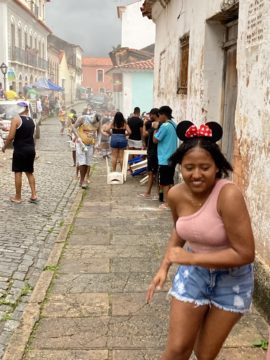
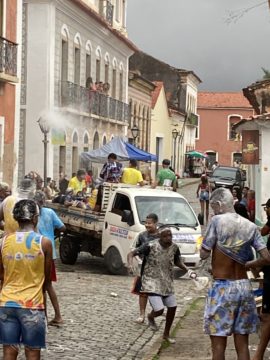 It’s a parade. People and vehicles are winding through this part of the old town, drums and trumpets leading the way. In the back of an old pick-up truck, a drag queen dances to its rhythms, voguing when she sees me taking photos with my phone.
It’s a parade. People and vehicles are winding through this part of the old town, drums and trumpets leading the way. In the back of an old pick-up truck, a drag queen dances to its rhythms, voguing when she sees me taking photos with my phone.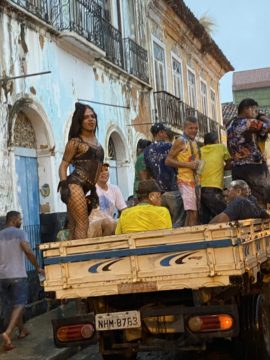
Excited, feeling lighter for the first time since the evening before, I circle around the neighboring blocks so I can glimpse the front of the parade.
Which is when the sky erupts again much like the evening before.
A huge yellow object at the front of the parade comes towards me, hard to focus on in the fog. A blow-up figure like the Michelin man or something from the Macy’s Thanksgiving parade. Propelled forward by a cart, it is about fifteen feet high, somehow more male than female, and wears briefs on which the name Pele has been written.
A perfectly heterosexual national hero who’d recently died celebrated in the queerest most beautiful of ways.
.